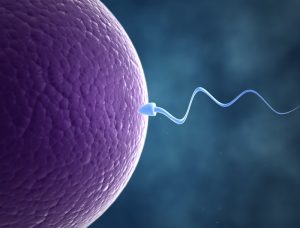Recently, scientists at the University of Minnesota found two promising compounds that may become the first non-hormonal contraceptive drugs for males. Testing on mice found that these compounds reduce sperm count effectively and present no side effects.
There are currently no non-hormonal birth control pills on the market for females or males, despite these pills likely having fewer harmful side effects than the hormonal birth control methods available for females.
And since males continuously generate sperm while females are born with all potentially fertile eggs, it is easier for scientists to find approaches that reversibly stops sperm production in males rather than risk “spoiling” the non-renewable pool of eggs in females.

Picture depicting the meeting of sperm and egg, which leads to fertilization and pregnancy. Image Credit: https://flic.kr/p/MCcsUf
The first potential drug discovered is a chemical named YCT529, reported by Dr. Gunda Georg’s group in spring 2022. This molecule was designed to inhibit the function of the protein retinoic acid receptor alpha (RAR-α). Georg’s scientists found that a lack of RAR-α protein in male mice leads to sterilization, but no additional side effects. When YCT529 was orally administered to the mice for 4 weeks, their sperm count reduced drastically, and the drug was 99% effective in preventing pregnancy.

Chemical structure of non-hormonal male contraceptive YCT529. Image Credit: Ying Cai
The same group of scientists reported the second drug named EF-4-177 in early 2023. The target of this molecule is an enzyme named cyclin-dependent kinase 2 (CDK2) which helps in sperm cell production. The scientists reported an over 45% decrease in sperm count of the mice after 28 days of treatment with EF-4-177.
Currently, a startup named YourChoice Therapeutics based in Berkeley, California is working to market YCT529 to humans soon. According to their website, the company has tested on dogs and primates with positive results. Their graphics show that after two weeks of treatment with YCT529, sperm levels in dogs drop to zero and primates do not produce enough sperm to be fertile.
If a side effect-free non-hormonal birth control pill for males is introduced to the public, it would expand contraceptive options for those with testicles beyond condoms and vasectomy. As well, it would make it easier for the responsibility of pregnancy prevention to be shared between partners in a relationship.
Hopefully, more research to come will soon make non-hormonal birth control pills for males a reality.
~ Ying Cai
